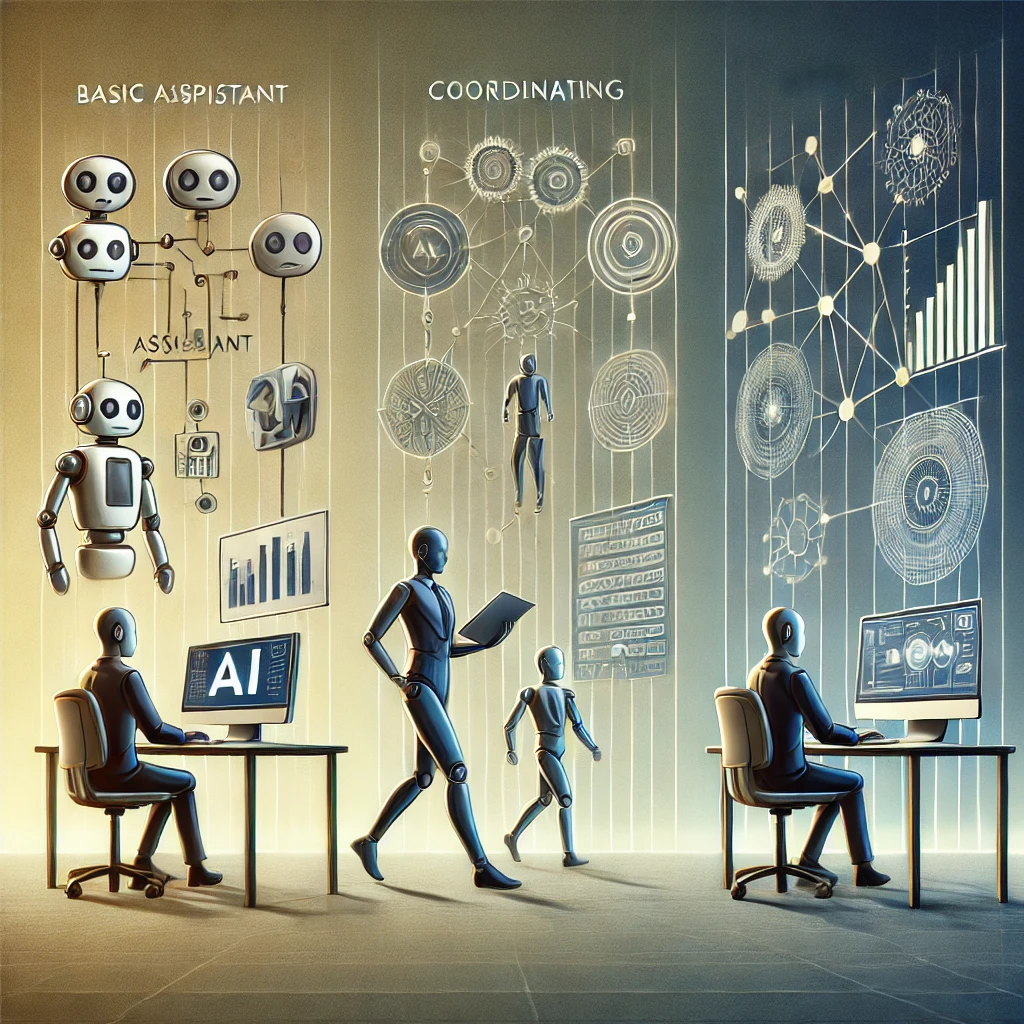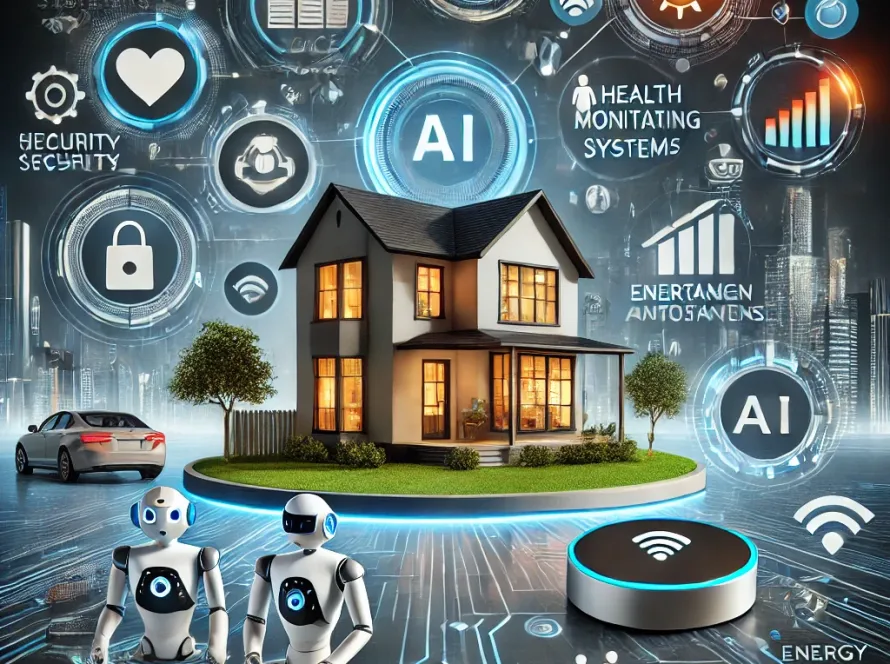Imagine a world where AI agents handle tasks from scheduling reminders to autonomously driving vehicles—it’s closer than you think. As artificial intelligence evolves, we are witnessing a rapid expansion of AI agents capable of handling everything from simple tasks to advanced decision-making. Companies like Microsoft, Amazon, Apple, Meta, Samsung, Google, OpenAI, and Tesla are leading the way, working actively to create AI agents that can assist people in everyday life, both at home and in the workplace. But what are AI agents, and what phases can we expect in their development? Here, we delve deeper into these questions and explore each company’s unique contributions to this field.
What is an AI Agent?
An AI agent is an autonomous, AI-driven entity that performs specific tasks with minimal human involvement. These agents are designed for various purposes, including information gathering, data analysis, and automation. As AI technology matures, we are witnessing a progression from basic assisting AI agents to more independent entities capable of making complex decisions.
Different Types of AI Agents and Their Roles
Each type of AI agent serves a unique purpose, tailored to meet the specific needs of individuals, businesses, or broader societal goals. Let’s take a closer look at these roles.

- Personal Agents
Personal agents support individuals in their daily routines, enhancing productivity and convenience. They can assist with reminders, control smart home devices, or answer questions. Popular examples include Siri, Alexa, and Google Assistant, which learn users’ preferences to provide better recommendations and responses, creating a seamless, personal digital experience. - Persona Agents
Persona agents create a specific user experience by imitating a personality or role. Common in customer service and education, these agents can act as friendly customer service representatives, knowledgeable librarians, or virtual mentors, offering guidance and support. They foster engaging and human-like interactions, adding a personal touch to digital support. - Company Agents
Developed to represent a company and adhere to corporate guidelines, company agents are frequently used in customer service, HR, and marketing. They handle tasks that require specific knowledge about the company’s products and services, ensuring brand consistency and operational efficiency. These agents are becoming essential for businesses looking to provide consistent, high-quality service at scale. - Tesla’s Unique AI Agents
Tesla’s approach to AI agents spans several innovative applications, pushing the boundaries of autonomy across multiple fields:- Full Self-Driving (FSD): Tesla’s FSD system is designed to achieve full vehicle autonomy. With access to vast data from Tesla’s fleet, this AI agent continuously learns and adapts, handling complex real-world traffic scenarios.
- Dojo Supercomputer: Tesla’s Dojo is a supercomputer specialized in processing massive amounts of video and image data, enabling rapid training of Tesla’s autonomous driving models and enhancing the capabilities of Tesla’s AI agents.
- Tesla Bot (Optimus): A humanoid robot designed for tasks in both home and industrial environments, Tesla Bot uses the same AI as Tesla vehicles. It autonomously navigates and performs various tasks, representing Tesla’s vision to expand AI-driven autonomy beyond the automotive field.
- Energy Management with Powerwall and Megapack: Tesla’s AI-driven energy solutions optimize energy usage and seamlessly integrate with the grid. These AI agents regulate energy based on demand, maximizing efficiency and contributing to sustainable energy management.
- Vehicle Safety AI: Tesla’s real-time AI ensures vehicle safety by analyzing data continuously, identifying potential hazards, and adapting in real-time to protect passengers.
- Amazon’s Approach with Alexa and AWS
Amazon is a significant player in AI agent development through its personal assistant Alexa, smart home infrastructure, and AWS cloud services.- Alexa: As one of the most widely used personal AI agents, Alexa supports users in daily activities, from setting reminders to controlling smart home devices. By integrating with thousands of third-party applications and devices, Amazon has built an extensive ecosystem that positions Alexa as a central smart home hub.
- Echo Devices as Smart Home Hubs: Amazon’s Echo devices serve as smart home hubs, enabling Alexa to coordinate with IoT devices. This allows Alexa to automate complex sequences, such as adjusting lighting and locking doors, illustrating how personal agents can act as coordinating agents in the home.
- AWS and AI Infrastructure: Amazon Web Services (AWS) offers powerful AI and machine learning services, such as Rekognition and Lex, allowing businesses to build their own AI agents. AWS is a cornerstone in Amazon’s strategy, supporting global AI development through scalable infrastructure.
- Security and Privacy in Smart Homes: Amazon prioritizes security and privacy within its smart home ecosystem by implementing regular updates and user control options, such as data transparency and privacy settings, which are crucial for gaining user trust.
- Apple’s Integration of Siri, HomeKit, and Core ML
Apple’s AI strategy emphasizes privacy, security, and seamless integration across devices, creating a user-friendly experience focused on personal autonomy.- Siri as a Personal Agent: Siri is Apple’s AI assistant, embedded in iPhones, iPads, Macs, and Apple Watches, offering support in daily tasks such as reminders and weather updates. Many Siri functions are processed on-device to enhance privacy and reduce data sharing.
- HomeKit for Smart Home Management: Apple’s HomeKit allows users to control compatible smart home devices via Siri and the Home app, emphasizing security with end-to-end encryption. Siri can function as a coordinating agent in the smart home, linking multiple devices and automating tasks for enhanced convenience and security.
- Core ML and Device-Level AI Processing: Apple’s Core ML framework and Apple Silicon enable AI processing on the device, keeping user data private. This approach aligns with Apple’s commitment to privacy, as data remains on the user’s device instead of being sent to external servers.
- Integrated User Experience with Security and Ease of Use: Apple creates a cohesive AI experience across its devices, where Siri and HomeKit serve as the AI backbone of Apple’s ecosystem. Future developments could see Siri become more autonomous, though always with a focus on user control and data security.
- Meta’s Role in Social AI and the Metaverse
Meta’s AI-agent strategy focuses on creating interactive social agents, metaverse assistants, and content moderation for safer social platforms.- Social AI Agents and Chatbots: Meta uses AI-driven agents and chatbots integrated into Messenger and Instagram to handle customer support and automate engagement. These persona agents are designed to foster human-like interactions, helping businesses and influencers improve user experiences on Meta’s platforms.
- Metaverse and Virtual Agents: As Meta builds its metaverse, it envisions AI-driven agents that serve as digital guides, social companions, and interactive characters within virtual worlds. These agents enhance the metaverse experience by helping users navigate and interact more naturally in digital spaces.
- AR and VR with AI Support: Meta leverages AI to create engaging AR and VR experiences on platforms like Oculus and Spark AR. With Spark AR, developers can create and share custom AI-driven interactions, broadening the reach and application of social AI.
- Content Moderation and Safety: AI agents on Meta’s platforms help detect and moderate harmful content, ensuring safer interactions across its vast social network.
- Samsung’s Approach with Bixby and SmartThings
Samsung’s AI strategy integrates Bixby as a personal assistant and SmartThings as a coordinating platform for smart home environments.- Bixby as a Personal Assistant: Bixby, integrated into Samsung’s smartphones, smart TVs, and home appliances, provides a personal AI assistant experience. Bixby can control smart devices, manage schedules, and personalize tasks, creating a consistent experience across Samsung’s ecosystem.
- SmartThings as a Smart Home Hub: Samsung’s SmartThings platform connects compatible smart devices, enabling centralized control via a single app. This makes SmartThings a powerful coordinating agent, with Bixby providing voice control for a more hands-free experience.
- AI in Smart Appliances: Samsung incorporates AI-driven features in home appliances like washing machines and refrigerators, allowing these devices to learn from user behavior and optimize their functions, making life more convenient and efficient.
- IoT and Edge Computing for Home AI: Samsung’s emphasis on IoT and Edge Computing means that data is processed close to the user, which improves both speed and security in AI-driven interactions.
Real-World AI Agent Applications Today:
- Healthcare: AI agents support diagnostics by analyzing patient data and assisting in treatment planning.
- Retail: Virtual agents provide personalized product recommendations based on individual shopping preferences.
- Finance: AI agents assist in fraud detection, financial analysis, and customer support, streamlining complex processes.
Phases of AI Agent Development
The development of AI agents can be divided into three phases, each representing increased levels of autonomy and complexity:
Phase 1: Assisting Agents (Basic Automation)
In the first phase, AI agents primarily function as support tools. They can perform specific tasks based on predefined instructions but still require human supervision. Microsoft’s Copilot exemplifies an AI agent in this phase, as it helps users with tasks in Office applications but still requires human interaction for effective operation. Agents in this phase streamline workflows, handling repetitive tasks and assisting with basic functions.
Phase 2: Coordinating Agents (Advanced Automation with Interaction)
In Phase 2, AI agents gain a higher level of autonomy and can coordinate multiple tasks, analyze data, and act based on user needs. Anthropic and Google’s AI initiatives exemplify this phase, as their agents can analyze data, make recommendations, and perform multi-step tasks independently. Tesla’s FSD system, Amazon’s Echo smart home coordination, Apple’s HomeKit integration, and Samsung’s SmartThings platform are key players in this category, processing data in real time, adapting to new situations, and refining capabilities with every interaction.
Phase 3: Autonomous Agents (Full Autonomy and Decision-Making)
The third phase represents the ultimate goal for many AI developers: a future where agents are fully autonomous and capable of making their own decisions without human oversight. OpenAI plans to launch AI agents that can function without human intervention, and Tesla is also pushing boundaries with its Tesla Bot (Optimus) and advanced autonomous driving systems. Phase 3 agents promise a transformative level of autonomy, managing everything from routine tasks to high-stakes decision-making and strategic planning. These advancements could redefine industries by enabling AI agents to operate independently, supporting entire processes without human input.
How Leading Tech Giants Are Shaping the Future of AI Agents
The contributions of Microsoft, Amazon, Apple, Meta, Samsung, Google, OpenAI, and Tesla underscore the diverse applications of AI agents. These companies are advancing technology in personal assistance, smart home management, social interaction, and autonomous decision-making. With rapid advancements in AI agent technology, we are likely to see a world where AI agents become essential companions in both professional and everyday life, shaping a future where AI empowers creativity, problem-solving, and strategic thinking.
The future is exciting, and with these innovations, AI will not only be a tool but an integral part of our lives.
Want to Develop Your Own AI Agent?
Ready to dive into the world of AI agents yourself? Continue reading our next post, “DIY AI Agents: A Guide to Developing Your Own AI Agents Using Open Source Tools”, where we walk you through the essential open-source libraries, programming frameworks, and step-by-step examples to kickstart your journey in AI agent development. With accessible, community-driven tools and libraries, you’ll have everything you need to create custom AI agents tailored to your needs!


